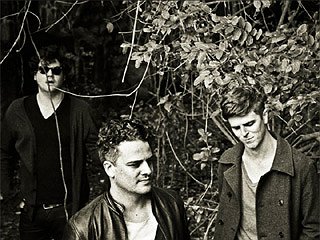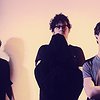Name: Richard Pike (PVT)
Occupation: Singer/ Composer
Current Release: New Spirit on Felte
Musical Recommendations: Alex Cameron, Nathan Fake
If you enjoyed this interview with PVT, you can find more information on their website.
When did you start writing/producing music - and what or who were your early passions and influences?
I guess I really started bands when I was a kid. Of course it was recording jokey songs to cassette with my brother and school mates. But I really took music making more seriously in high school, when I discovered a kind of convergence of rock and jazz and classical. I was a nerd pretty early on I guess. 'Producing' though, I started in earnest when I went to university, at the Sydney Conservatorium of Music. I was studying Ligeti and Louis Andriessen in the day and listening to Aphex Twin at night. It wasn't until I heard Aphex and Autechre that I got a computer. Up until then 'electronic music' was 90s pop and house music which I hated with a passion. I bought a second hand Macintosh G3, and started producing Pivot's first album (before it became PVT). That was around 1999. I didn't get the record out till 2005.
For most artists, originality is first preceded by a phase of learning and, often, emulating others. What was this like for you? How would you describe your own development as an artist and the transition towards your own voice?
Yeah I guess I'm still developing even now; you never stop (maybe not the emulating part but certainly the search for my own voice). It's occurring with each new phase in my life. The learning and emulating part was fun though and I had several bands trying different things. I was a keen singer early on, but had more bravado than skill. Now that I've improved as a musician I'm constantly trying to get back to the bravado bit… unlearning what I've learnt. There's an essence to music making which is purely about energy and intent and the substance comes from that. That's why someone who might be technically a bit shitty can be brilliant.
What were your main compositional- and production-challenges in the beginning and how have they changed over time?
I've always found recording sound to be enjoyable, even though at first I maybe took too long on things to get them right. Trying to work on the sound of an album so that it sounds like nothing else… that takes time. Avoiding clichés is hard, because they're everywhere in music.
I guess I've become accustomed to having a small budget for actual studio time– only going in for a few days to track the major things. Then doing a lot of post-production, or writing on my own with material, especially when it comes to developing the vocals and lyrics. That's something that needs time and care. There's nothing worse than throwaway lyrical content. Put some effort into it, guys.
Tell us about your studio, please. What were criteria when setting it up and how does this environment influence the creative process? How important, relatively speaking, are factors like mood, ergonomics, haptics and technology for you?
I live in London, so the first factor is actually finding somewhere to make sound, without much noise coming in too. Then there's the rent. So essentially I've found a great room in Fish Island, East London. It's an industrial area; I've got to buy lunch from a tradesman's food truck in the car park of a Screwfix. It's bleak. But the room is great: it's in an old office building that some guys involved in techno and electronica have taken over, sound-proofed, and filled it with musicians. It's a rarity to find a community like that in London. The other one's I've been in were a bit more... Wild West. People living in their tiny studios… not good. So yeah, after a while that was a definite factor; you need to create a comfortable space for you to feel creative in.
What are currently some of the most important tools and instruments you're using?
I guess it's a laptop. Over the years I've used my guitars less and less. Guitar was my first instrument but I sort of fell out of love with it a little, ever since I started collecting analog synths (mainly 70s Roland stuff). When I moved from Australia to England it was cheaper and easier for me to find vintage synths here (they're impossibly expensive down under). I use Ableton the most; I used to swap between several platforms but Ableton is what I use every day. And I've fallen in love with Spectrasonics Omnisphere 2. It's amazing. Don't tell anyone.
Many contemporary production tools already take over significant parts of what would formerly have constituted compositional work. In which way do certain production tools suggest certain approaches, in which way do they limit and/or expand your own creativity? Are there any promising solutions or set-ups capable of triggering new ideas inside of you as a composer?
This is something I think a lot about at the moment. How can we use these computer tools – that everyone has access to now – to make something unique? It constantly surprises me at the moment that although most people have access to a mass of sounds, and possibilities, that a lot of modern music sounds the same. It could just be fashion–which has always happened I suppose–but, if computers make music-making understandable for the layman, then wouldn't we have a more educated listening base? Wouldn't more people know how a basic dubstep or grime or techno track is made, therefore appreciate something more shocking, surprising, weird or different? It's almost as if tastes are more conservative than before, now that the studio production 'barrier' has been taken away. And I sort of blame millennials…for being too scared to be punk in any way.
But I'm going on a tangent here. To answer the question in terms of my own processes, I always react to things in my own way, and I come from an era where a preset or a sound or template given to you on a plate is not creative. I get excited once I interact with it, change it, make it grow into something living and breathing in its own right. To answer your question about 'solutions' to trigger ideas as a composer, for me that comes from within, and from your habits that you form as writer. That's stuff that happens before you even use the tools.



